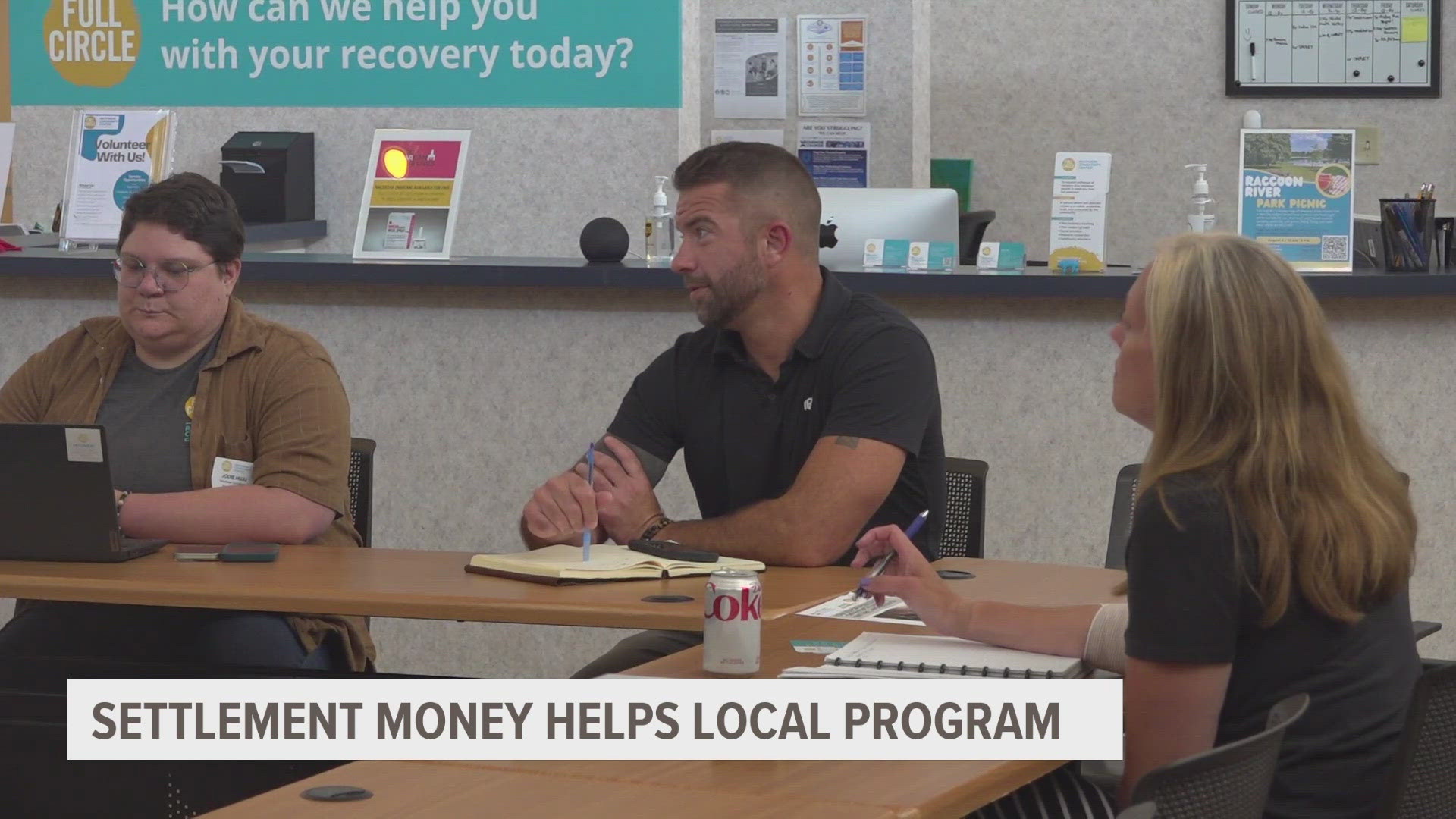DES MOINES, Iowa — The opioid epidemic has stolen countless lives across America and that doesn’t stop at Iowa.
According to state data so far this year, 60 people in Iowa have died in opioid-related deaths. In 2023, 238 people died.
Full Circle Recovery Community Center in Des Moines is one of the organizations fighting those numbers.
Full Circle’s efforts are saving lives and, thanks to new grant money from opioid settlements, they could reach hundreds more each year. John West is an example of that.
“One of the most difficult things I had to do was get honest with myself and figure out that, if I don’t get this figured out, there’s no prison that’s going to hold me. There’s only a grave," he said.
The start of July was the beginning of a new life for West.
It wasn’t the first instance he finished serving time, but this time he was on a path to recovery. He started his journey about a year before he was sentenced.
“For the first time in my life, I was going to do something for me. I was sick of living the way I was living and it was just a miserable existence. The methamphetamines and the heroin…anything that was available, it just consumed my life," West remembered.
West is a success story coming out of Full Circle’s corrections recovery coaching program in Polk County Jail. It's a program that $200,000 of grant money will go towards.
“To have hope after you’ve literally been through the gutter is an amazing feeling. It’s not something I ever thought I’d experience in my lifetime," he said.
The program helps guide people who are in jail because of drug-use to recovery through planning and emotional support. It also gives participants connections to support they can lean on after they get out.
“That’s a pretty good feeling. An absolutely amazing feeling to know that someone actually cares," West said.
That wisdom is coming from people who’ve gone through addiction and incarceration and made it out to the other side.
Tracey Gryp, now a staff member at Full Circle, started the program after seeing a gap in the system first-hand.
“I sat in a state prison for three years with no opportunity for hope or growth or self improvement. They have a little bit of programming where I was and again I didn’t qualify for any of that because I had treatment 17 years prior," she said.
Gryp and West said support from people who understand what you’re going through is important.
And now West can help others join him in recovery.
“My predecessors as I like to call them, they’ve paved a way for me to walk through and I know I cannot keep this…there’s no way I can keep sobriety without helping another person," he said.
When asked what else Polk County can do to fight the opioid epidemic, Gryp and West pointed to expanding treatment resources so people aren’t put on a waitlist for help.
Gryp said it's hard for people to get a bed in treatment. She said it's critical for people who are ready to change to get treatment as soon as possible because wait times can undo that progress. She said more beds are needed.
West has faced that wait before.
“I’ve been in situations where they say ‘Oh I’ll have a bed available for you in two weeks,’ like what? I’m an IV user. Like I’ve stuck heroin in my veins and it’s not a place where you’re like okay I can wait two more weeks. I’m going to be dead in two weeks," West remembered.
Gryp also pointed to the importance of access to harm reduction tools. She's especially passionate about decriminalizing fentanyl test strips.
"Iowa does a really good job right now of providing Narcan but there are times when people are using alone. I've gone through that with my own family. I had a family member die from using methamphetamine. If he had a fentanyl test strip, he may be alive today," she said.
Gryp added that something needs to change in order to make signing up for Medicaid, which opens the door to multiple resources, an easier process.
"I've talked to several people who say the process is super confusing now. They have to wait long periods of time," she said.
Still, there's hope for the future. West said resources to get help are becoming more available.
"When I first started with my addictive behaviors, there was no help. Like there was a treatment center here, a treatment center there, but it's becoming a lot bigger. There are resources now," he said.
The opioid epidemic doesn't just impact people who use opioids as their drug of choice. Gryp pointed out that other people with substance use disorder still end up consuming opioids because of drugs being laced.
And it goes farther than that. It impacts families too because people die from it, leaving behind loved ones.

